Blog Archives
‘The Who’s Tommy,’ a Nod to the Past, and Segue into the Future

If you are a fan, The Who’s Tommy, currently in its first revival by Des McAnuff, (he directed the show’s original Broadway presentation over thirty years ago), may absolutely thrill you with its exuberant, pulsating electricity and phenomenal musical arrangements. With music and lyrics by Pete Townshend, additional music by John Entwistle and Sonny Boy Williamson II, and Ron Melrose’s music supervision and additional arrangements, it’s a gobsmacking explosion from the past for Boomers, and a scintillating acceleration into the future for Generations X, Y and Z. The production’s hyper-effects leave the music thrumming in one’s mind long after you leave the Nederlander Theatre, where the revival is currently in an unlimited run.
The rock opera which exploded on the music scene in 1969, in long album form was codified as groundbreaking, and eventually was inducted into the Grammy Hall of Fame. Townshend’s chords and story line were memorized by legions in the immediate years after, as critics and fans alike interpreted what the story could be about.
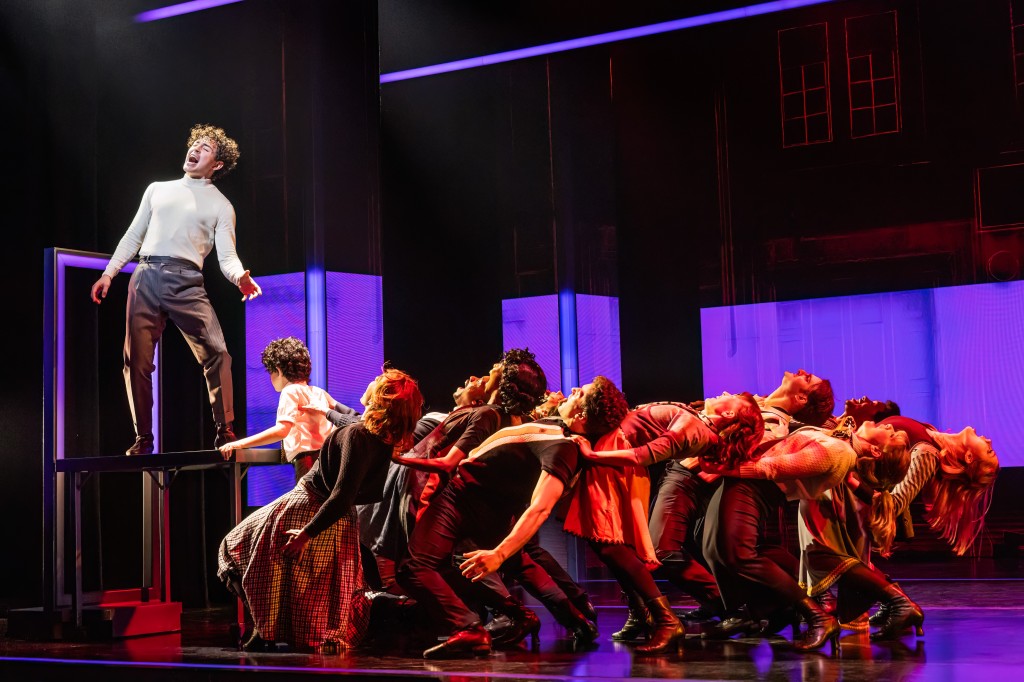
Meanings and symbols spanned from Jesus to Buddha to Townshend’s own avowed inspiration, Meher Baba. The interpretation encompassed a spiritual leader who arcs the soul’s journey and helps mankind and womankind shatter the ego/carnal self to see and feel the spiritual immortality in their humanity. However, mistakenly assuming that everyone’s path toward wholeness can be achieved via the leader’s methods, he makes his followers do exactly as he did, making them suffer. His followers rebel and ultimately reject and metaphorically crucify the one they formerly idolized. The reward is not worth the path of suffering, denial and dedication to get there, they feel, as they take out their suffering on Tommy’s parents while he escapes to solitude and the seeker’s path at the conclusion.
Of course, these interpretations reflected the progressive spirituality and dedicated movement toward liberation of the late 1960s-70s, heavily influenced by psychedelics, flower power, gurus and shamans from various cultures, belief in peace-not war, and the Jesus Freaks movement (not the same as carnal, conservative evangelical, political Christianity today). Duly inspired, the maverick British film director Ken Russell created his hybrid fantasy drama musical based on The Who’s titular album. With an exceptional cast (Oliver Reed, Ann Margaret, Roger Daltrey, Tina Turner, Elton John, Jack Nicholson), Russell maintained the story which centered around traumatized Tommy Walker (Roger Daltry in the film). The literal story follows from the film and subsequent productions, Broadway (1993), through the first section until the latter part of Act II.
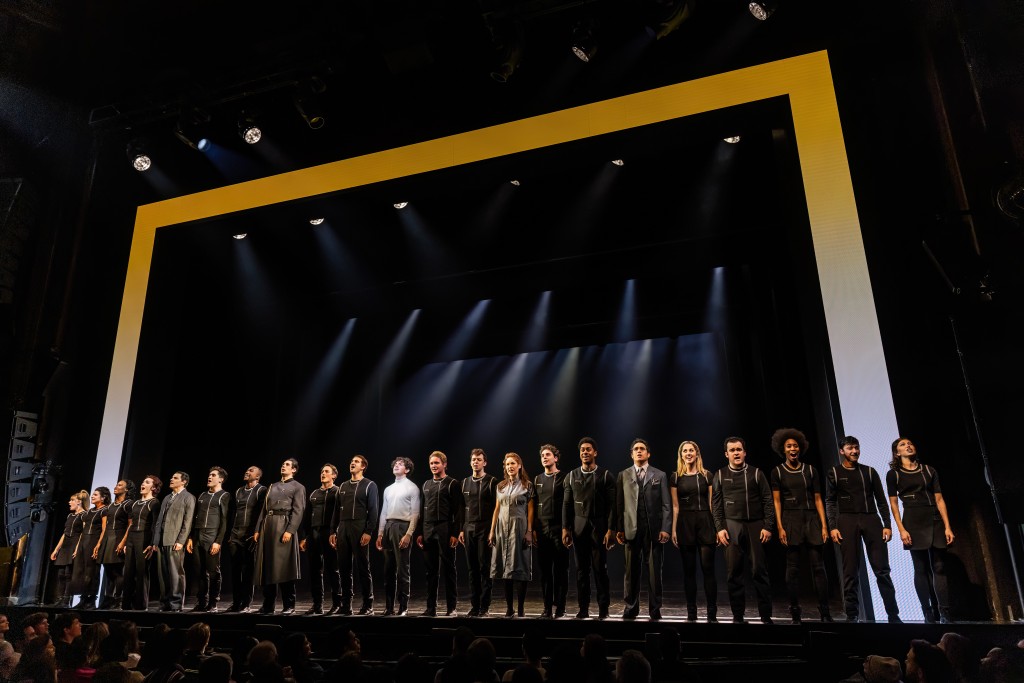
This latest Broadway revival veers off after the healed Tommy establishes his fan base and seeks to “correct” them with his methods. Townshend and McAnuff’s book sterilizes the retributive, shocking ending. Tommy purists may not like how the book truncates the force of the last half. “Tommy’s Holiday Camp” is cut, as is the subsequent brutality visited on his fans and parents. Some songs are added, without the same musical strength as those in the original album. The spiritual concepts are also minimized. Instead, this version emphasizes the visual, futuristic design spectacle of the production by David Korins (scenic design), Amanda Zieve (lighting design), Saragina Bush (costume design), Peter Nigrini (projection design).
It suggests video gaming culture and the small screen iPhones and Androids forever before our faces. In the suspended lighted frames of all sizes in various scenes that generally frame the story, is the theme that society and parents frame us. These frames echo and the central mirror framed by lights that Tommy repeatedly looks into and looks out of. The effect echoes the culture’s “branding,” boxing in everyone to fit in to get along.
Not having seen other productions, or The Who in concert, the updated, futuristic spin for me, carried its own message, themes and warnings. Certainly, with its high-tech projections and minimalist frame lighting, echoing the frame of the mirror which Tommy is obsessed with and his mother eventually shatters, we are reminded of our current culture’s preoccupation with gaming, selfies, ego, self-importance and encouraged selfishness. Especially through the staging and design, this version emphasizes such nihilistic obsessions and the danger of small screens whose App platforms brainwash, distract and seduce.

This theme moves throughout this revival’s technical aspects which align with our own culture’s deluded “deaf, dumbness and blindness” and the near cultism inspired by hand-held devices. These have increasingly disassociated us from our own natural environments and directed us toward a dystopian, fabricated world view of division, hatred and insult or complete distraction and entertainment with the effect of protecting adherents in their own information silos. This parallels how Tommy protects himself with his psychosomatic illness.
This version begins with Peter Nigrini’s fine production design that spins a black and white collage backdrop of the setting for 1941. Against that backdrop acted out are the Walker’s marriage, the German POW Camp, etc., as the Overture plays and the company sings.
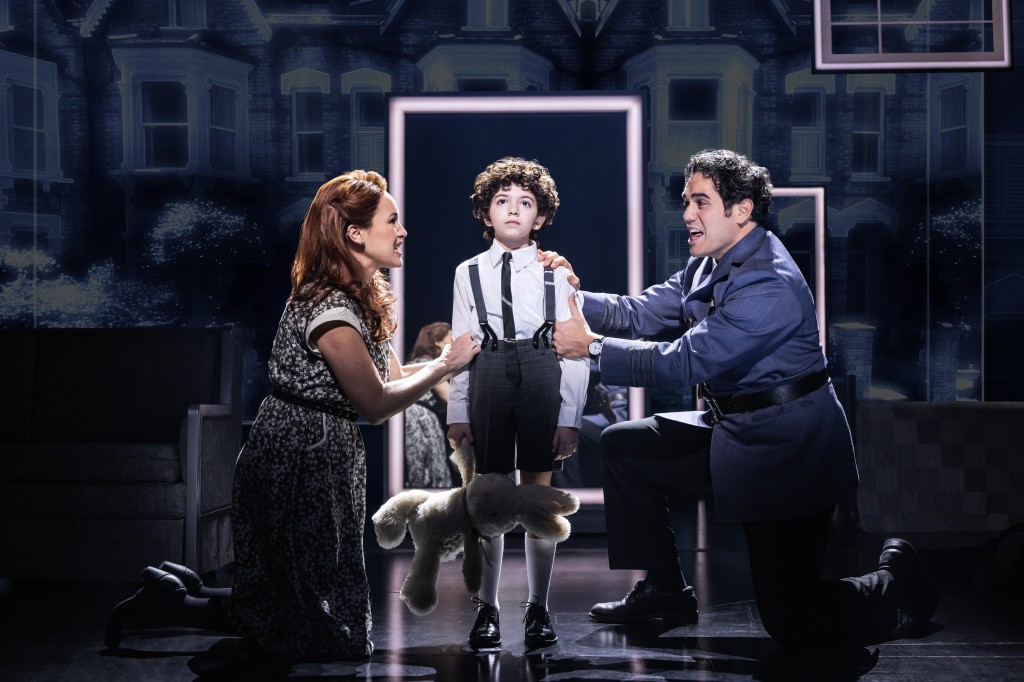
Mrs. Walker (the sweet voiced Alison Luff whose climactic moment of shattering the mirror is delivered forcefully), gives birth (“It’s a Boy”) after which Tommy’s father, Captain Walker (Adam Jacobs), is believed to have died, though the war has been won (“We’ve Won”). Understandably, Mrs. Walker takes another lover (“Twenty-One”), but when Captain Walker returns to see his wife in the lover’s arms, he kills him in front of four-year-old Tommy (Cecilia Ann Popp and Olive Ross-Kline alternate days). Told by his parents to suppress what he sees and hears about the manslaughter, Tommy turns himself “deaf, dumb and blind” in a crazed psychosomatic obedience and rebellion against his warped, fearful parents (“Amazing Journey”).
As Tommy grows up unresponsive and uncommunicative with his parents and his environment (Quinten Kusheba and Reese Levine portray the 10-year-old Tommy alternating days), he is further traumatized by his pedophile Uncle Ernie (John Ambrosino’s part is sanitized in the song “Fiddle About”), and sadistic cousin Kevin played by the superbly arrogant, wickedly sinister Bobby Conte, who gloriously sings as the perfect, cruel foil to Tommy’s innocent. Both villains “babysit” Tommy as his parents neglect him (“Do You Think It’s Alright?”).
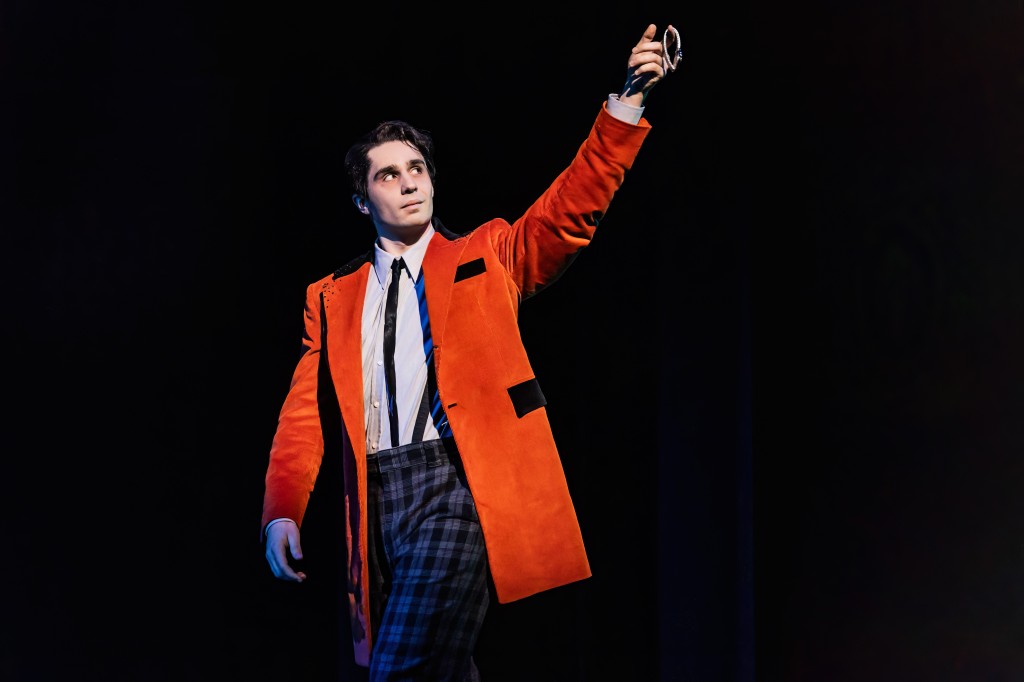
The actors portraying the younger Tommy are incredible as automatons. Their performances represent the result of horrid parenting and enforced objectification, when children receive orders then respond/rebel in original ways. In the story Tommy is an objects to be played upon and pushed around. I found this interpretation by McAnuff frighteningly symbolic, giving new meaning to parental abuse, neglect and force-feeding an obedient image, “acceptable” to his parents. They remain obtusely unaware about their integral part in suppressing Tommy and fashioning him into a non-person who screams “See me, Feel Me,” for he wishes to be free from the soul bondage.
Tommy’s future, older self is portrayed by the stellar Ali Louis Bourzgui, whose voice shatters consciousness itself with its phenomenal power and nuance. McAnuff has him stand in the light-framed mirror, reflecting back his alter-ego when the younger Tommys look in the mirror, their backs to the audience. This is open to interpretation. One possibility is a metaphoric representation of hope of who Tommy can become, including the whole person, free and in touch with his spirituality.

Though Tommy diminished three of his senses to suit his parents’ wishes, he compensates with an enhanced sense of touch and his sixth sense tied to his imagination (“Sensation”). A series of fateful events leads Tommy to become a pinball champion with his energized sense of touch. But despite this compensation and rise to fame, his parents want him to check in with reality, tired of the robot they created unaware. This leads to a series of interventions at a clinic and at a place where Tommy can receive drugs from the Acid Queen (Christina Sajous).
This wild scene in what looks like a crack den out of a Spike Lee Joint (film), reveals Sajous to be a desperate addict doing the bidding of her pimps. Jacobs’ Walker relents at the last minute and leaves with Tommy. It is another veering off of the original album and Russell’s film (with Tina Turner as the Acid Queen in an unforgettable performance in the film). This redirection which purists will object to de-glamorizes the positive effects of psychedelics in what is now becoming treatment for PTSD survivors and those with severe depression. However, sanitizing the Acid Queen scene also emphasizes the father’s desperation to have his son cured. He’ll try anything, but then realizes “anything” has its own potential horrors.
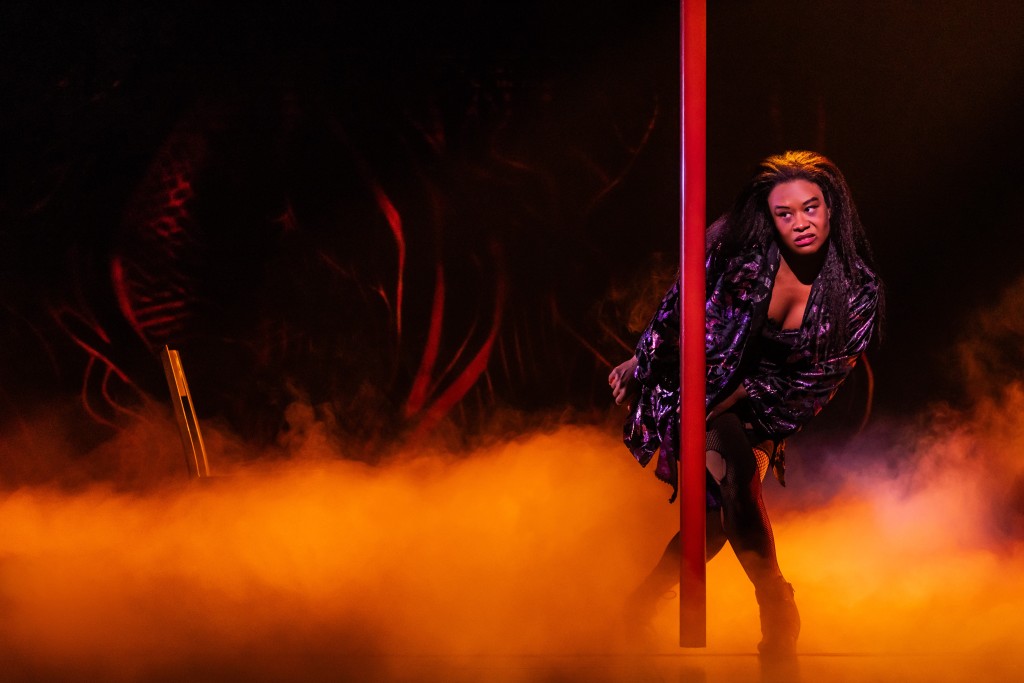
Obviously, Townshend and McAnuff keep the audience away from the disturbing and unsettling as much as possible, reflecting the conservatism of our times which ironically has given rise to the runaway chemicals of the pharmaceutical industry, controlled substances and highly addictive prescription medications like oxycontin and fentanyl. Both highly addictive “meds” have caused thousands more deaths than “orange sunshine.”
“Pinball Wizard,” the spectacular number sporting contrasting colors, flashing lights, searing projections and uber-technicals, as the grown Tommy “shows his stuff,” is breathtaking. Sung by Bobby Conte and the ensemble (with a nod to Elton John in the film by an unnamed “Local Lad” who belts out the opening salvos of the song and is fantastic), the audience experiences a gyration of emotions as the first act ends. The music has elevated and mesmerized, and one is left anticipating Act II with the timeless rock music pulsating through minds, hearts and bodies.
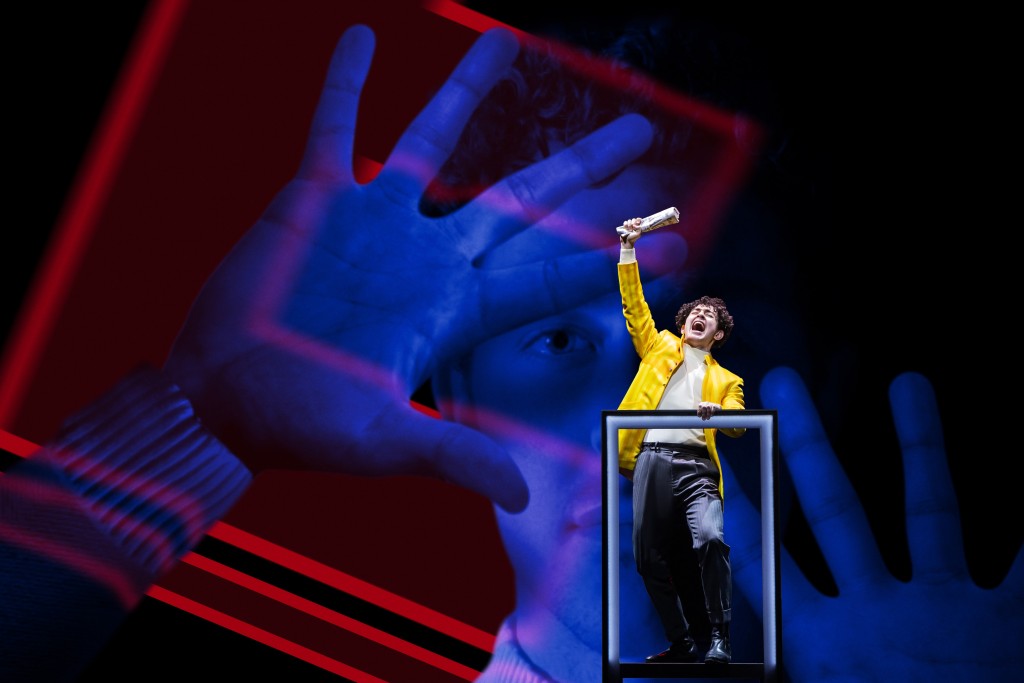
The first Des McAnuff production of The Who’s Tommy in 1993 starred Michael Cerveris as Tommy. The production, nominated for 11 Tonys, won five, including Best Original Score for The Who co-founder and musician Pete Townshend. The revival will surely be nominated, principally for its phenomenal find in the latest Tommy, Ali Louis Bourzgui, whose penetrating voice, compelling presence and powerful mien establish Tommy in all aspects of the character, implying sensitivity, charisma, spirituality and the ability to mesmerize and lead.
However, in updating The Who’s Tommy to make it relevant for our time, the spirituality and wisdom of the album’s meaning is inevitably softened to encourage a frightening look at our contemporary culture, albeit also softened. If anything is at fault with this version, though there is too much that is great which does mitigate any faults, a flaw is this. McAnuff didn’t go far enough with his vision to expose the importance of Tommy’s message-the need to return to spirituality, with direct references to the current ubiquitous technology, fake, hollow Christianity, and memes that seek to globalize, pasteurize and with cacophonous, information overload, overwhelm the importance of original unique voices emerging from the human spirit.

The finale attempts to do this. It happens as the audience and cast, who stands on the edge of the proscenium, sings “See Me, Feel Me”/”Listening to You.” It is enough, yes, but it also isn’t. With so much at stake in our present culture, with so great a need for people to return to inner healing and spiritual wisdom, McAnuff’s softening of the inherent villainy and spiritual revelations of the original album with an incomplete update of the cultural relevance, might be a lost opportunity. Regardless, I loved The Who’s Tommy.
Kudos to those not mentioned before. These include Lorin Latarro (choreography), Steve Margoshes (orchestrations), Charles G. Lapointe (wig & hair design).
The Who’s Tommy. Nederlander Theatre, 208 W. 41st. St., New York with one intermission. TommyTheMusical.com
‘Ain’t Too Proud, The Life and Times of the Temptations’ is Just WOW!

Ephraim Sykes (kneeling) and the cast of ‘Ain’t Too Proud’ (Matthew Murphy)
At the Imperial Theatre for 2 and 1/2 hours, there are musical numbers and dance moves that will so send you into the realms of the fabulous, I doubt you will want to come down to earth. The magic, history, poignance and joy displayed by the production company creatives of Ain’t Too Proud, are bar none. The show is one of the best on Broadway.
Special accolades go to Des McAnuff for his seminal direction and staging and Sergio Trujillo for choreography. But the rising glory must land on the actors and ensemble responsible for the breathtaking portrayals of the “Classic 5 Temptations,” Derrick Baskin (as Otis Williams) James Harkness (as Paul Williams) Jawan M. Jackson (as Melvin Franklin) Jeremy Pope (as Eddie Kendricks) and Ephraim Sykes (as David Ruffin), not the least of which include those portraying the additional Temps. These are just fantastic, the “stuff that dreams are made of.”
By the conclusion of Ain’t Too Proud, I felt like I had spent time with loving family who passed, but for a moment were returned to me by an act of grace so I might delight in the music of a pivotal time in the tumultuous 1960s. Brought back to life by the astute genius and prodigious talents of the performers, one more uniquely magnificent than the other, each manifested the perfection of golden-voices and harmonies synced to fluid gestures.

Christian Thompson, Saint Aubyn, Ephraim Sykes, Jeremy Pope, Derrick Baskin, and Jawan M. Jackson in ‘Ain’t Too Proud, directed by Des McAnuff (Matthew Murphy)
The story of The Temptations in Ain’t Too Proud (book by Dominique Morisseau based on the The Temptations by Otis Williams with Patricia Romanowski) is crucial to understanding our country’s vitality in progress through grinding work and sacrifice. And it is a reminder of how the human spirit can strive in the face of prejudice and discrimination to overcome and burgeon into greatness. The production highlights the personal sacrifice it took to be world renown, as Otis (Derrick Baskin) reveals very poignantly at the conclusion what happened in his life and in the lives of each of the “Classic 5.” And it is a story of possibilities, forgiveness and reconciliation.
Most importantly, Ain’t Too Proud is the chronicle of two individuals who united in a vision to transform The Elgins into The Temptations and ultimately crossover artists who would be play in London and other cities off US shores. Founder/organizer/creative genius in his own right, Otis Williams was the “engine who could.” He is still going strong as the last of the “Classic 5.” He is still creating and has established the 24th iteration of The Temptations whose name he owns. The other individual is Berry Gordy. He is the maverick, genius promoter, visionary of the Motown label who had more hits and strategies up his sleeve than Houdini (one of them was songwriter Smokey Robinson of The Miracles) coupled with an acute sense of the historical and cultural timing to create his own brand of
When Williams and Gordy met in the men’s room of a place where Gordy was scouting talent, Williams introduced himself and lightening struck. R & B, and the future of soul was indelibly made and both men’s destiny as well as the destiny of black people in our nation was shaped forever by these two future Rock and Roll Hall of Famers: Gordy in 1988, Williams in 1989 as a Temptation.
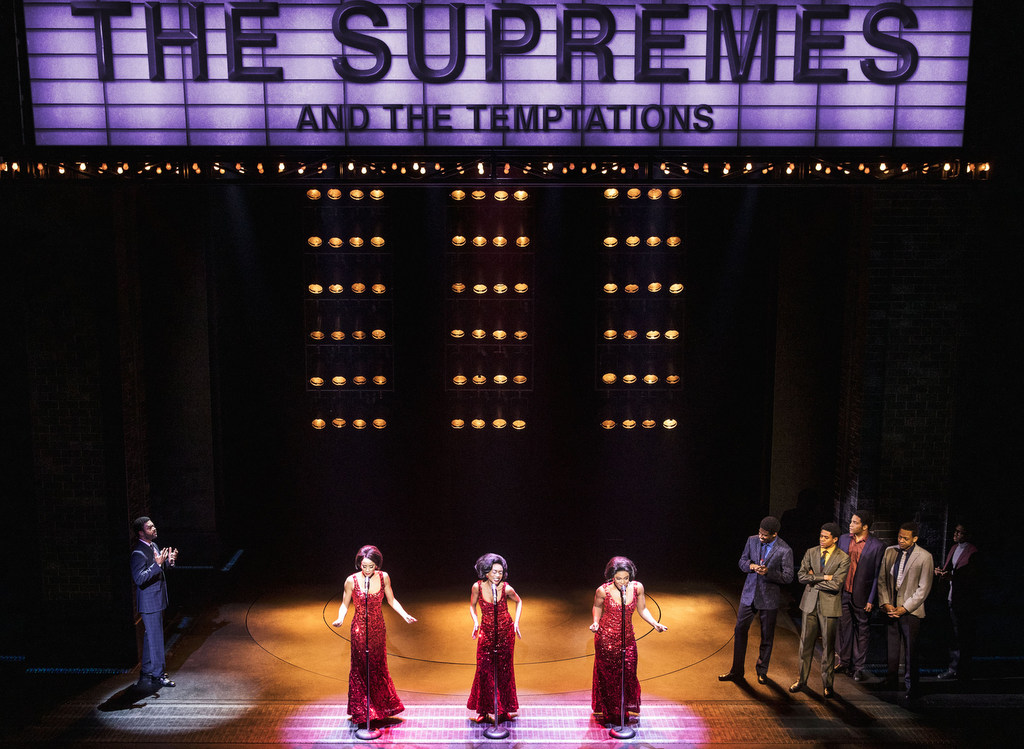
The cast of Broadway’s ‘Ain’t Too Proud (Matthew Murphy)
Motivated by money and the example of Civil Rights leaders like Martin Luther King Jr., Gordy understood that one way to best racism was through music. He helped to make those who sported the Motown label (The Supremes, The Miracles, The Temptations, The Commodores, Marvin Gaye, and so many more) ambassadors of good will. This was during a time when there was little good will to be had because of racial divisions and bigotry especially from those who embraced generational hatreds fomented by the Southern planter class. Jim Crow had even filtered to the North with redlining neighborhoods separating communities into wholly white or wholly black.
The planter class who lost their lucrative “peculiar institution” along with their place of gentrified greatness after the Civil War, whipped up the discriminatory sentiments of economically impoverished or working class whites. These wealthy brainwashed whites to believe they shared a common heritage in being “white.” The irony was, none of the wealthy ever sat down to eat with the economically challenged whites or associated with them in the same society or culture. They were kept far away in the “low rent districts” on the other side of the railroad tracks near the town dumps or sewage treatment plants.
When Gordy has the Temptations tour parts of the South and their bus is shot at and nearly stopped (if it had been they wouldn’t have made it to the next day) we see the extent of the Jim Crow hatreds. These echoes from the past unfortunately have currency for us today. The show reminds us that we have progressed, but must remain steadfast with what has been accomplished, which certainly The Temptations and Berry Gordy’s incredible vision helped to achieve.

Jeremy Pope and Candice Marie Woods (center) and the cast of ‘Ain’t Too Proud,’ directed by Des McAnuff (Matthew Murphy)
Ain’t Too Proud’s book by Dominique Morrisseau is based on the book The Temptations by Otis Williams with Patricia Romanowski. The show features the music and lyrics from “the legendary Motown Catalog.” These elements plus the grist and hard work to bring them together in one ineffable, miraculous meld make this a sensational production. As I walked out after the standing ovations, I saw folks still sitting in the audience either chatting excitedly or just staring off in delighted appreciation in awe at what they had just experienced.
What makes this such a sterling production is that the incredible performances of the “Classic 5” (Baskin, Harkness, Jackson, Pope, Sykes) are brought to life singing favorites in the chronological order of their growth and evolution. Otis Williams (Baskin) narrates this development, and we follow him as he leads us through the arc of their glory to become the #1 stars of the Motown label. The songs are recognizable. Some favorites include “Baby Love,” “Ball of Confusion” “For Once in My Life,” “Get Ready,” “If You Don’t Know Me by Now,” “My Girl.” As Otis (Baskin is just gobsmacking as he weaves the threads through to the present day) relays each event in their various lives, we see the parallels with the appropriate songs.

Ephraim Sykes, Jeremy Pope, Derrick Baskin (forground) Jawan M. Jackson, and James Harkness in ‘Ain’t Too Proud,’ directed by Des McAnuff, book by Dominique Morisseau, based on the book ‘The Temptations’ by Otis Williams with Patricia Romanowski (Matthew Murphy)
So special is this song selection that pegs the songs to the emotional resonance of the group’s life situations! When we hear the backstory or see the dynamic of their personal relationships, the songs vibrate with energy and transcendence. This is powerfully effected with “Cloud Nine,” “I Wish It Would Rain,” “What Becomes of the Brokenhearted,” and “War.”
Another thrilling element of the production is its retrospective of the 1960s, and how through the reflection of music, our culture and history changed forever. Music and transformation was mirrored during the 1960s movements, The Civil Rights and Peace Movements, as well as the Cultural and Sexual/Gender Revolution. The songs parallel, symbolize and manifest that time. Their lyrics and beauty, however, are for all time.
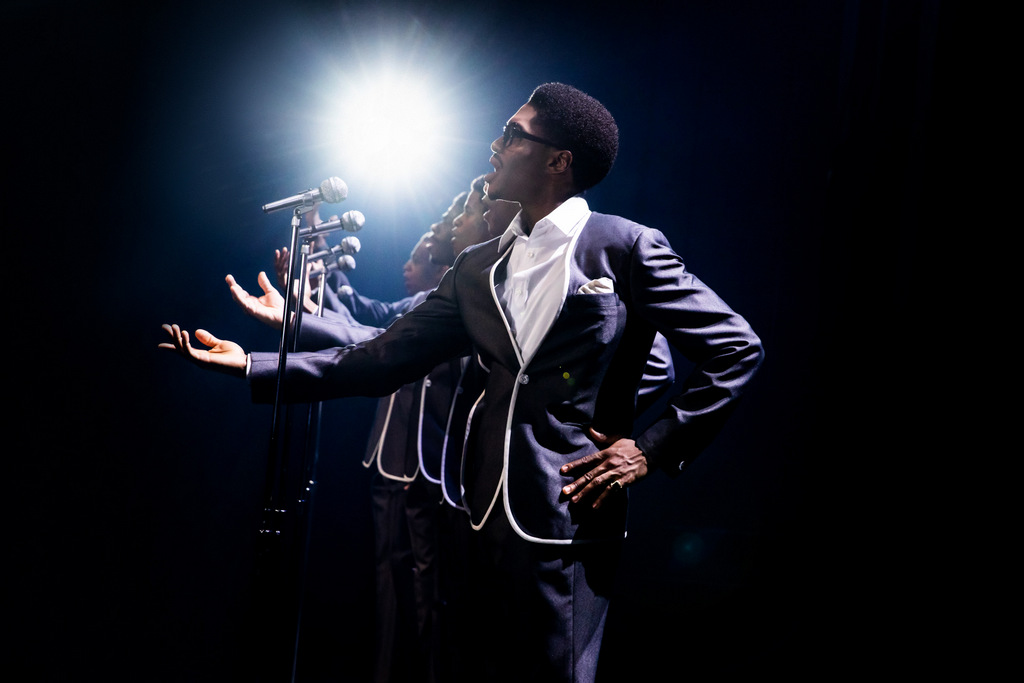
(L-R) Derrick Baskin, Jawan M. Jackson, Jeremy Pope, James Harkness, and Ephraim Sykes (front) in ‘Ain’t Too Proud,’ directed by Des Manuff (Matthew Murphy)
The director Des McAnuff folds in The Temptations’ viewpoints about Detroit’s unrest, Martin Luther King’s assassination and the rise of drugs which were flooding college campuses and spreading like a flood in all parts of the music scene. The film clips and projections of the Detroit riots, the marches, the King Jr. assassination are integral to the story of the Temptations.
Primarily, the show is a loving encomium for the “Classic 5” Temptations who were the founders of the original chart-busting group. It is also a reveal about how the genius of Motown and the transcendent talents of these five prodigiously hard-working performers shaped cultural attitudes against racism and prejudice at a time when the South was still lynching blacks, and when assassinations of Malcolm X, the Kennedys and Martin Luther King Jr. rocked the nation, fomenting profound sadness and hopelessness.
Through all of it, is the ineffable sound of this group and its add-ins as some left and others came back. After a decade out on their own, Kendricks (Pope) and Ruffin (Sykes) returned to perform. All the while The Temptations soared to Top 100 charts and even bested The Supremes’ position at Motown. Their music was the golden thread that transformed national attitudes toward race and reinforced that as citizens we can be decent. The Temptations drew opposing sides away from polar extremes. They encouraged that the shared love of R & B can take us beyond division and hatred.
Special kudos go to Orchestrations by Harold Wheeler and Music Direction and Arrangements by Kenny Seymour. Recognition also goes to Robert Brill (Scenic Design) Paul Tazewell (Costume Design) Howell Binkley (Lighting Design) Steve Canyon Kennedy (Sound Design) Peter Nigrini (Projection Design) and other creatives whose collaborations make the production a smash hit out of the park.
Ain’t Too Proud is at The Imperial Theatre (249 West 45th Street). This must-see show runs with one intermission. For tickets go to their website by CLICKING HERE.